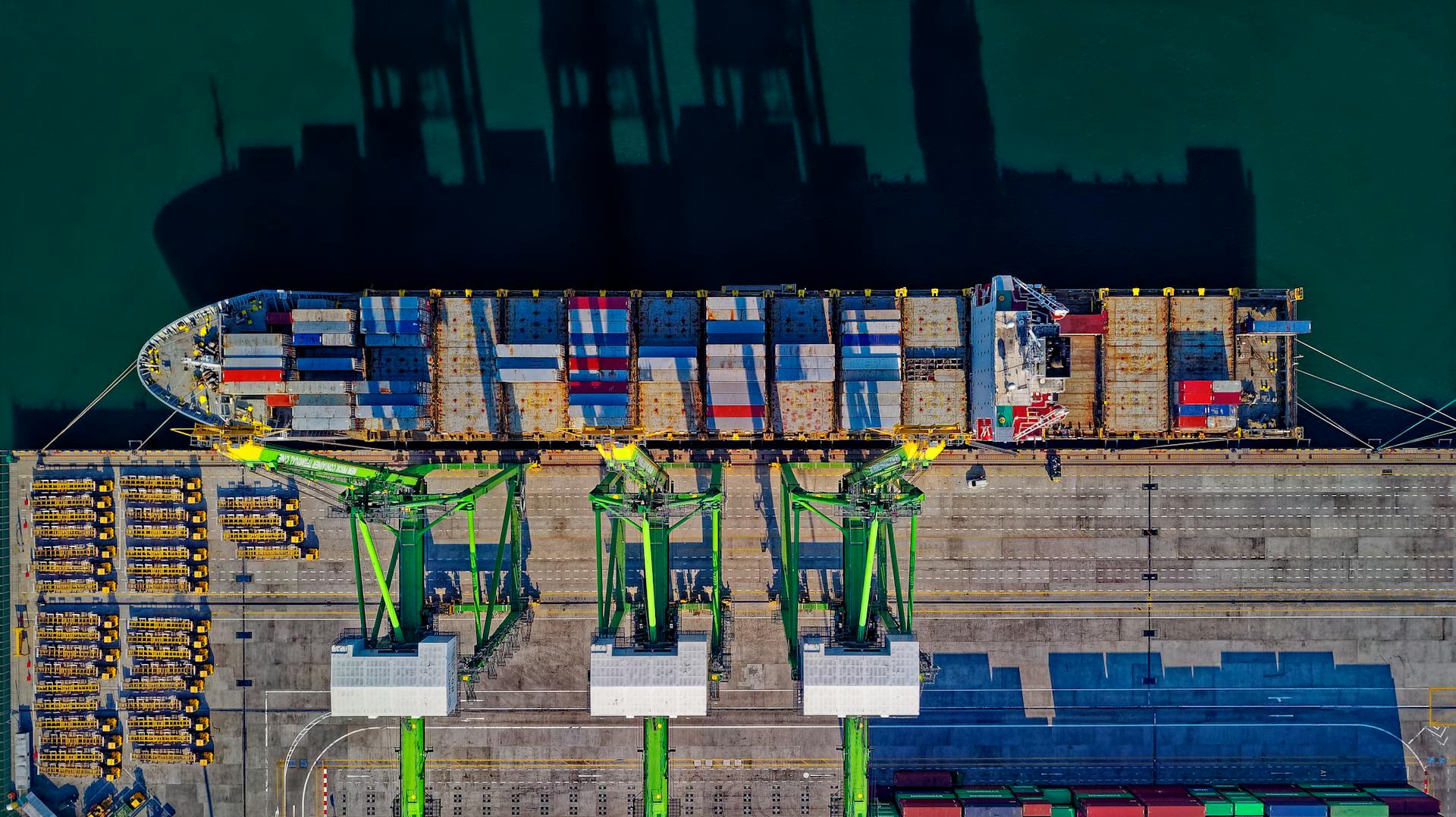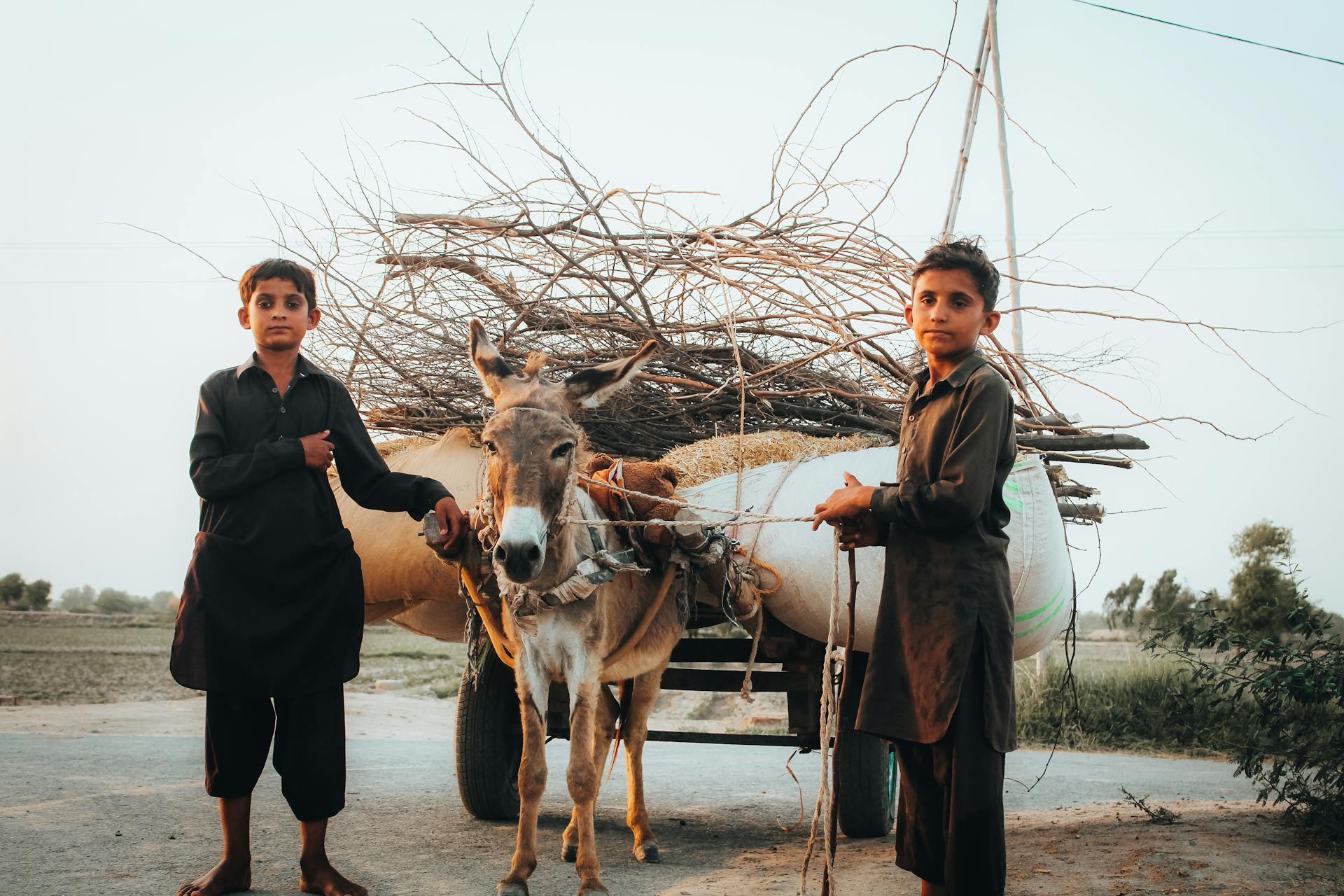
Animal transport trailers are designed to safely move animals from one location to another, often in a humane and comfortable manner. They typically come in different sizes and types to accommodate various animals and transportation needs.
You can find animal transport trailers for sale in a range of prices, from under $1,000 to over $10,000, depending on the size, features, and brand. Some trailers may also require customization to meet specific animal transportation requirements.
Customization options for animal transport trailers can include adding ventilation systems, tie-downs, and dividers to ensure animal safety and comfort during transport.
For more insights, see: Animal Christmas Gift Wrap
Types of Animal Transport Trailers
There are several types of animal transport trailers available, each designed to cater to specific transportation needs and preferences.
Gooseneck trailers are designed to connect to the bed of a pickup truck, providing increased stability and weight distribution. They're known for their strong towing capacity and are often used for transporting larger livestock.
Bumper pull trailers, also known as tag-along trailers, are connected to the hitch receiver on the rear bumper of a towing vehicle. They're smaller in size and ideal for hauling smaller herds or for short-distance transportation.
Horse trailers are primarily intended for transporting horses, but can also be used to transport other livestock. They're equipped with dividers and specialized features like living quarters or tack rooms for added convenience during long journeys.
Stock trailers are adaptable and can transport different kinds of livestock. They typically feature open sides, providing better airflow and visibility.
Double deck trailers feature two levels, allowing for more animals to be transported in a single trip. They're frequently used for large-scale livestock transportation, particularly for commercial purposes or when transporting a significant number of animals.
Here are some common types of animal transport trailers:
- Gooseneck trailers
- Bumper pull trailers
- Horse trailers
- Stock trailers
- Double deck trailers
These types of trailers are designed to meet specific needs and preferences, and choosing the right one is crucial for safe and comfortable transportation of livestock.
Trailer Specifications
Choosing the right trailer size is crucial for a smooth animal transport experience. It depends on the size of the livestock and the number of animals to transport.
A smaller trailer is best suited for SUVs and other vehicles with limited towing capacity, using a bumper pull. This setup is ideal for transporting a small number of animals.
Gooseneck trailers, on the other hand, are perfect for handling a large amount of livestock, providing stability and ensuring a safe journey. However, they do require a bed on the tow vehicle.
The dry weight of the trailer, combined with the estimated livestock weight, should be considered when choosing the right size. Don't forget to leave room for food, water, and equipment.
Suggestion: Mini Livestock Trailer
Size, Capacity
The size and capacity of an animal transport trailer play a crucial role in determining its cost. A small trailer can cost around $15,000, while a larger one can range from $25,000 to $35,000.
Suggestion: Truck Cargo Insurance Average Cost
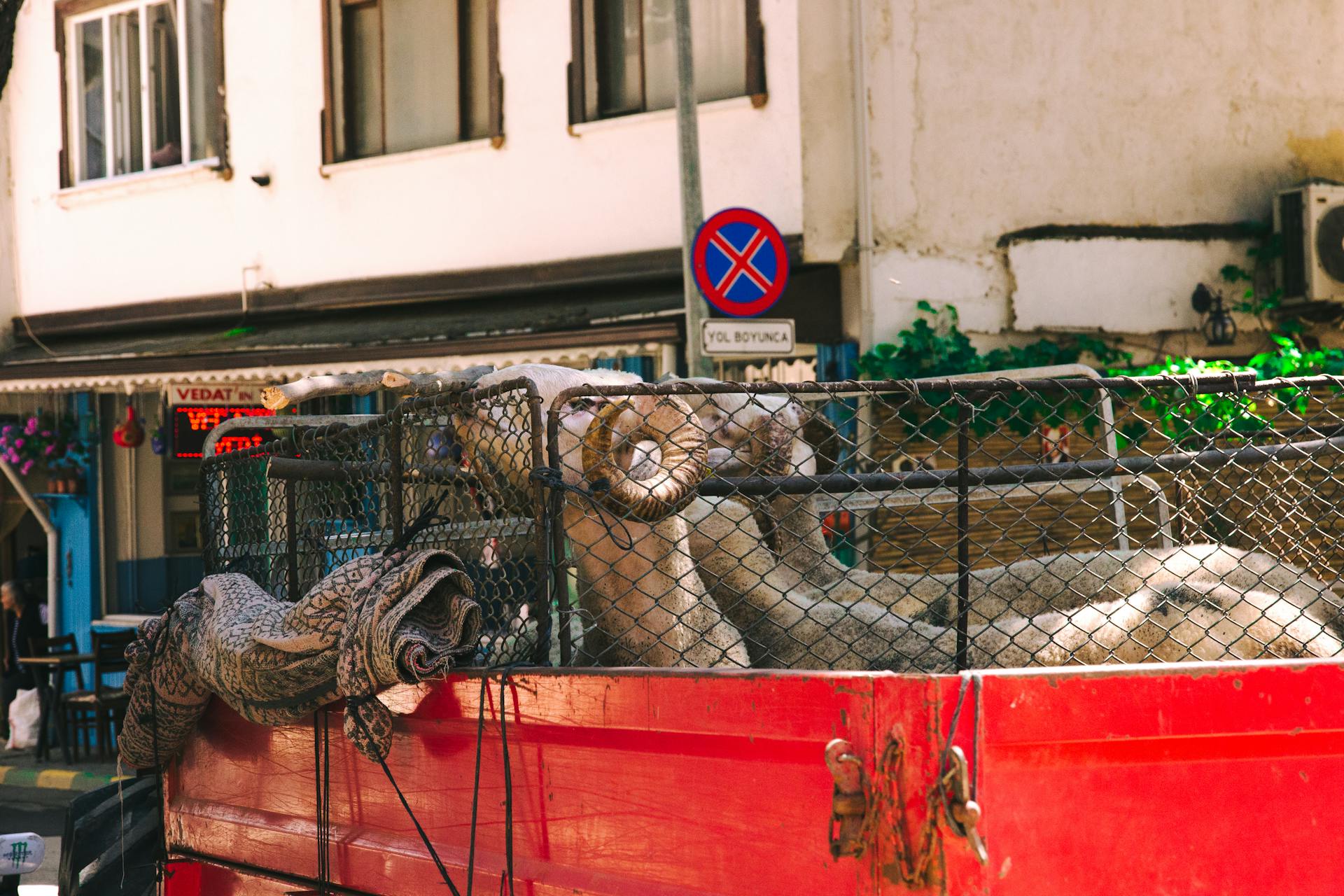
The size of the trailer also affects how many animals it can safely transport. For example, a 24′ x 7′ trailer can safely haul up to eleven cows that weigh 1,200 pounds each.
To give you a better idea, here's a chart that shows how many cattle can be loaded onto different sizes of trailers:
It's essential to note that this chart represents the maximum number of dehorned/poled cattle for different-length trailers. If you're transporting horned cattle, you should decrease the number of cattle by 5%.
Choosing the Right Trailer
Choosing the right trailer is crucial for safe and comfortable animal transport. Consider the size of the trailer, as it should accommodate the number of animals you plan to transport.
A small livestock trailer is ideal for transporting a small number of animals, while larger trailers with gooseneck hitches are better suited for handling a large amount of livestock. The size of the trailer also depends on the specific needs of the farmer or livestock owner.
When choosing a trailer, look for features such as sturdy flooring, secure latching mechanisms, and adequate ventilation to ensure the well-being of the animals during transportation.
On a similar theme: Small Aluminum Cargo Trailer
About Small
Small trailers are ideal for transporting a small number of animals, and they're best suited for SUVs and other vehicles with limited towing capacity.
A small livestock trailer is a compact and mobile unit designed for transporting animals such as cattle, sheep, goats, pigs, or other small farm animals.
These trailers are typically towed by a vehicle such as a truck or a tractor, which makes them a convenient option for small-scale farming operations.
You should consider the capability of your tow vehicle when choosing a small trailer, as it needs to be able to handle the weight of the trailer and the animals it's carrying.
Gooseneck trailers provide stability, but they do require a bed on the tow vehicle, so it's essential to have a suitable vehicle before investing in a larger trailer.
Explore further: Tiny Home Cargo Trailer
Small Buyer's Guide
When choosing a small livestock trailer, consider the size of the animals you plan to transport. A goat small livestock trailer is a common size.
Curious to learn more? Check out: Livestock Transportation
The material of the trailer affects its weight, durability, and resistance to corrosion. Steel, aluminum, and a combination of both are common materials used.
Adequate ventilation is crucial for the well-being of the animals during transportation. Look for trailers with windows, vents, or other features that promote good airflow.
The flooring should be sturdy, non-slip, and easy to clean. Some trailers have removable or washable flooring to simplify the cleaning process.
Verify that the towing capacity of your vehicle is suitable for the weight of the loaded trailer. It's essential to adhere to safety regulations and guidelines for towing.
A small livestock trailer bumper pull should accommodate most hitches for easy use.
Additional reading: U Haul Auto Transport Trailer Weight
Choosing the Right Trailer
Choosing the right trailer is crucial for safe and comfortable transportation of your livestock. Consider the size of your livestock and the number of animals to transport.
The size of the trailer should be determined by the capability of your tow vehicle, as well as the weight of the trailer and the animals it will carry. A small trailer is ideal for SUVs and other vehicles with limited towing capacity.
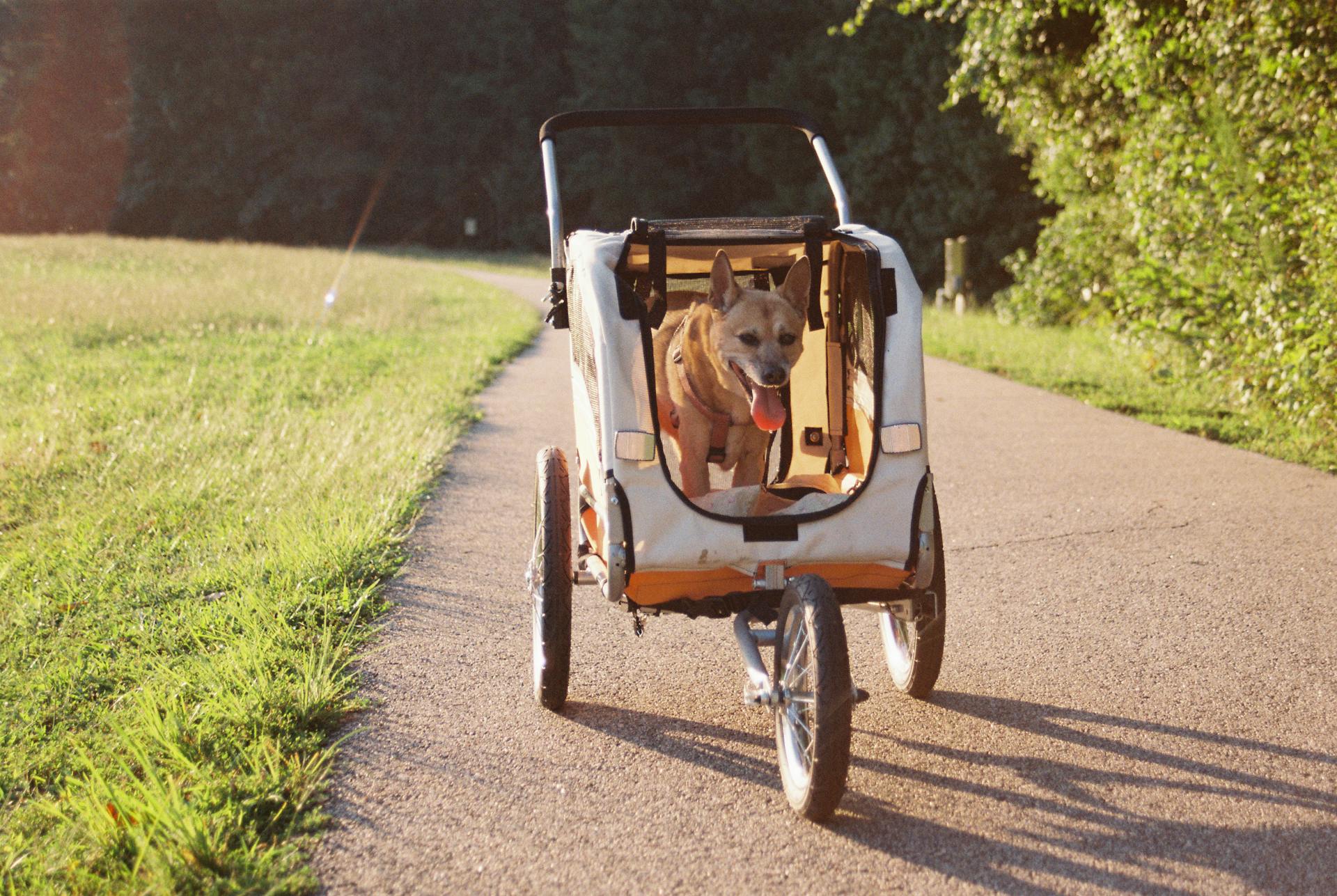
When choosing a trailer, look for features that promote good airflow, such as windows, vents, or other ventilation systems, to ensure the well-being of the animals during transportation. Adequate ventilation is crucial to prevent heat stress and other health issues.
A sturdy and non-slip flooring is also essential to prevent injuries to the animals. Some trailers have removable or washable flooring to simplify the cleaning process.
Security features, such as secure latching mechanisms and gates, are necessary to prevent animals from escaping during transport. Ensure that the trailer has these features to keep your livestock safe.
The towing capacity of your vehicle should be suitable for the weight of the loaded trailer, and it's essential to adhere to safety regulations and guidelines for towing. A small livestock trailer bumper pull should accommodate most hitches for easy use.
Adequate lighting is also essential, especially if you plan to transport livestock during low-light conditions or at night. Check that all the required lights are functional.
Consider consulting with experts, such as experienced trailer manufacturers or suppliers, for valuable insights into the latest innovations and best practices in livestock trailer customization.
Four Winds Trailers KY
Four Winds Trailers KY offers a variety of rent-to-own trailers to fit your needs. They have a selection of Gooseneck trailers, Enclosed trailers, Utility trailers, Car haulers, Equipment trailers, Tow dollies, and Dump trailers.
If you're looking for a trailer to transport livestock, Four Winds has you covered with their Gooseneck trailers.
Their rent-to-own options make it possible to own a trailer without breaking the bank upfront.
Recommended read: Gooseneck Trailer Transport
Customization and Features
Customizing your animal transport trailer is crucial for ensuring the safety and comfort of your animals. A well-designed trailer can make a huge difference in the health and productivity of your livestock.
Customization options can vary depending on the type of animals you're transporting, with different requirements for horses, cattle, and other species. By tailoring your trailer to meet these needs, you can reduce stress and potential injuries.
Additional features and accessories can enhance the functionality and usability of your trailer, but also increase the price. Some common features include gates, work lights, tack room saddle racks, hydraulic jacks, and more.
Check this out: Transportation of Animals
Frame Options
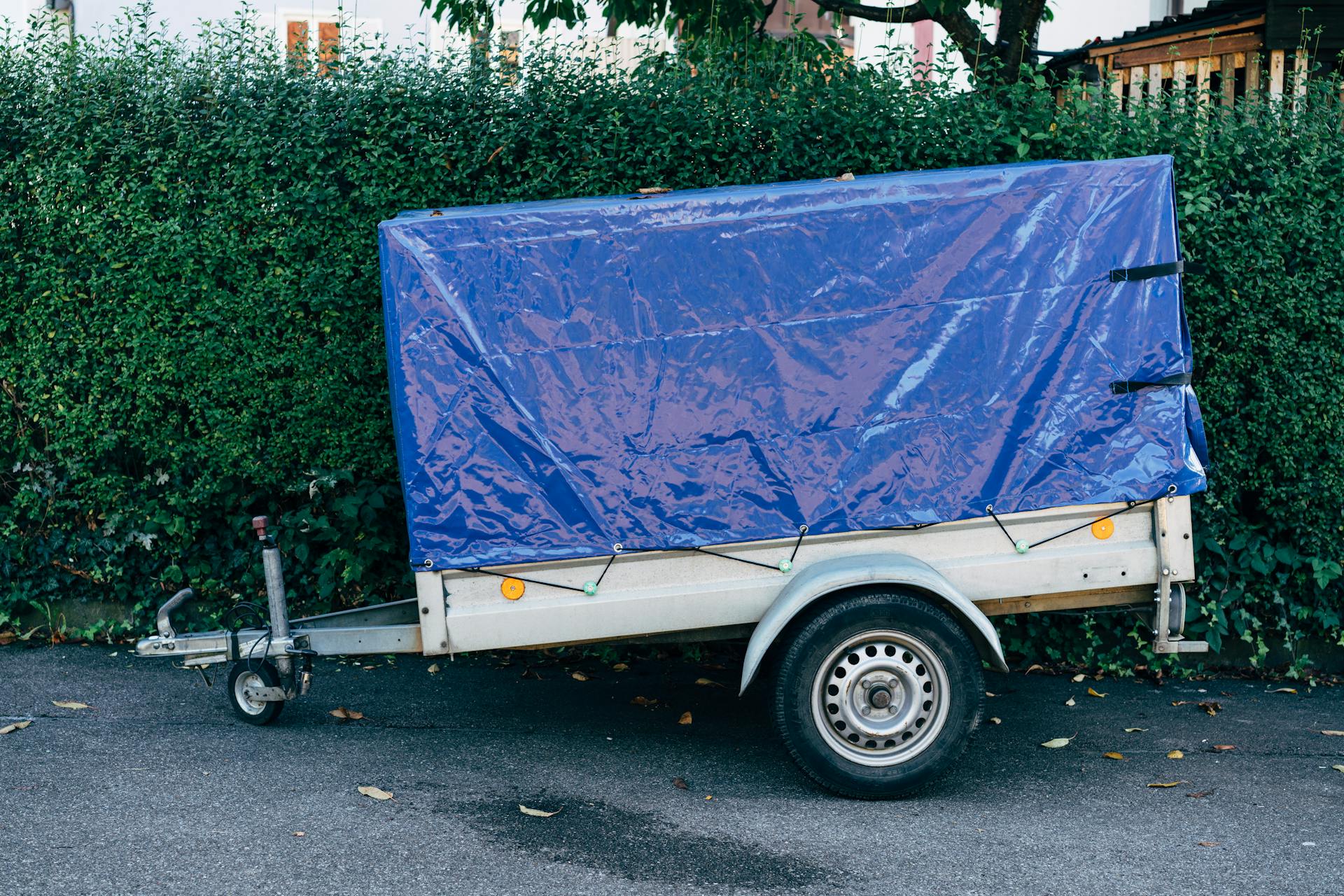
When it comes to the frame of a livestock trailer, durability and rust resistance are top priorities. Steel frames are a common choice, but they can be prone to rust, especially in areas where roads are treated with mag chloride or salt.
A steel frame can be a good option if you're looking for a durable frame at a lower cost. However, it's essential to purchase a trailer that has already been painted or plan to paint and maintain it to prevent rusting.
Aluminum frames are a great alternative, offering a lightweight and rust-resistant option. Although they're more expensive, they can provide long-term benefits.
Some manufacturers offer a combination of steel and aluminum frames, creating a robust and durable trailer that balances cost and performance.
Customizing
Customizing your livestock trailer is not just an investment, it's a necessity for safe and efficient animal transportation. A customized trailer can mean the difference between stress-free journeys and potential losses.
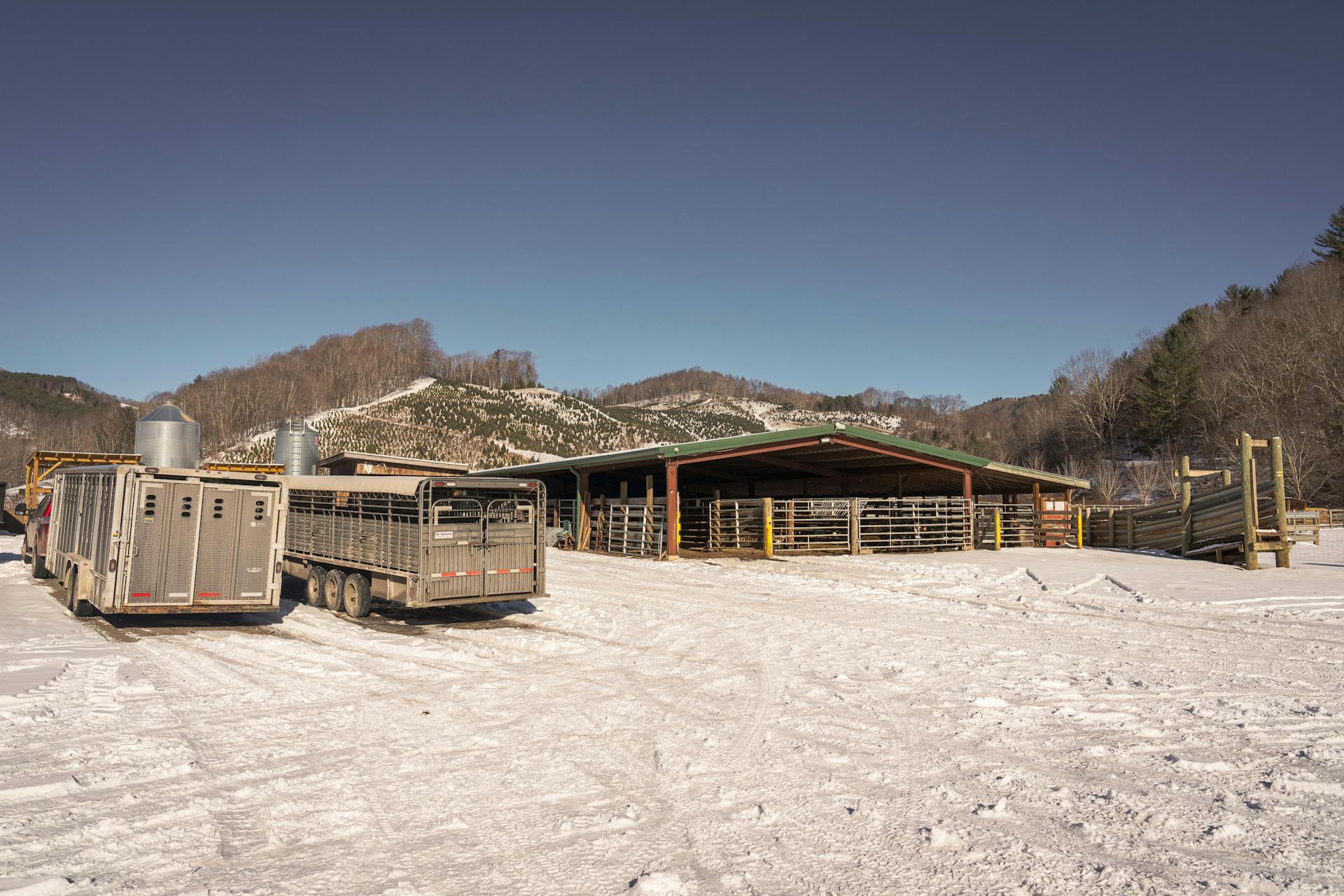
Customized trailers are designed to cater to the unique needs of different animals. From horses to cattle, each type of livestock has specific requirements that need to be met during transportation.
Additional features and accessories can significantly impact the cost of a livestock trailer, but they enhance the functionality and usability of the trailer. These features can include gates, work lights, tack room saddle racks, hydraulic jacks, and more.
Dividers are essential for separating animals during transit, preventing crowding and reducing the risk of injuries. Adjustable dividers allow for flexibility, accommodating different sizes and numbers of livestock.
Customizing your livestock trailer offers numerous benefits that extend beyond just transportation, including reducing stress and potential injuries, leading to healthier livestock. This, in turn, can enhance their productivity.
Transportation and Safety
When transporting animals, safety is a top priority. Animals can get anxious or stressed during transport, which is why it's essential to provide a comfortable and secure environment.
The animal transport trailer should be well-ventilated to prevent overheating. This is crucial for animals that are sensitive to heat.
Adequate space is also vital to prevent overcrowding, which can lead to stress and injury. The trailer should be designed to provide enough room for the animals to move around comfortably.
The trailer should be equipped with proper feeding and watering systems to ensure the animals receive the necessary sustenance during transport. This can include automatic feeders and water dispensers.
Regular maintenance of the trailer is essential to ensure it remains in good working condition. This includes checking the trailer's tires, brakes, and suspension regularly.
Animals should be secured in the trailer using proper harnesses or crates to prevent them from escaping or getting injured.
General Information
Animal transport trailers come in various sizes to accommodate different types of animals, such as horses, livestock, and even pets.
These trailers can be designed to meet specific needs, like ventilation systems for horses or secure enclosures for livestock.
A standard animal transport trailer typically measures 8-10 feet wide and 20-24 feet long.
Some trailers may have ramps or hydraulic systems to make loading and unloading animals easier and safer.
Animal transport trailers often have partitioned areas to separate animals and prevent stress or injury during transport.
Some trailers are designed with a raised floor or slatted flooring to improve air circulation and prevent moisture buildup.
Animal transport trailers can be custom-built to fit specific requirements, such as temperature control or specialized animal handling equipment.
Frequently Asked Questions
What is an animal trailer called?
An animal trailer is commonly known as a livestock trailer or cattle trailer. It's designed to safely transport cattle and other livestock with a spacious and secure enclosure.
What is the best livestock trailer?
There is no single "best" livestock trailer, as the top options include the Neckover Trailer, Hughes Trailer, W-W Trailers, and Galyean Trailers, each with their own unique features and benefits. Choosing the right one depends on specific needs and preferences.
Sources
- https://www.katestrailers.com/livestock-horse-trailers
- https://www.fourwindstrailers.com/blog/cattle-trailer/
- https://www.alibaba.com/showroom/small-livestock-trailer.html
- https://nationwidetrailers.com/blog/transforming-your-livestock-transport-with-customized-trailers/
- https://apex-trailers.com/blogs/news/how-much-does-a-livestock-trailer-cost
Featured Images: pexels.com


